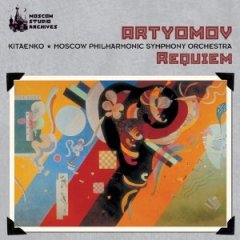Vyacheslav Artyomov – Requiem (2006)
Vyacheslav Artyomov – Requiem (2006)

1. Requiem, for chorus, boy's chorus, organ & orchestra: I. Introitus. Requiem
2. Requiem, for chorus, boy's chorus, organ & orchestra: II. Kyrie. Kyrie
3. Requiem, for chorus, boy's chorus, organ & orchestra: II. Kyrie. Dies irae
4. Requiem, for chorus, boy's chorus, organ & orchestra: II. Kyrie. Tuba mirum
5. Requiem, for chorus, boy's chorus, organ & orchestra: II. Kyrie. Recordare
6. Requiem, for chorus, boy's chorus, organ & orchestra: II. Kyrie. Confutatis
7. Requiem, for chorus, boy's chorus, organ & orchestra: II. Kyrie. Lacrimosa
8. Requiem, for chorus, boy's chorus, organ & orchestra: III. Offertorium. Domine
9. Requiem, for chorus, boy's chorus, organ & orchestra: III. Offertorium. Hostias
10. Requiem, for chorus, boy's chorus, organ & orchestra: IV. Sanctus. Sanctus
11. Requiem, for chorus, boy's chorus, organ & orchestra: IV. Sanctus. Benedictus
12. Requiem, for chorus, boy's chorus, organ & orchestra: V. Agnus dei. Agnus dei
13. Requiem, for chorus, boy's chorus, organ & orchestra: VI. Libera me. Libera me
14. Requiem, for chorus, boy's chorus, organ & orchestra: VI. Libera me. Requiem
15. Requiem, for chorus, boy's chorus, organ & orchestra: VII. In Paradisum. In Paradisum
Moscow Philharmonic Orchestra
Dmitri Kitayenko - conductor
Of Russian composer Vyacheslav Artyomov, Tikhon Khrennikov once said, "Artyomov is an outstanding composer. His Requiem has raised the Russian music to the unattainable height it had never reached before." This is a striking comment coming from the man who, in his capacity as the powerful head of the Soviet Composer's Union, was in 1979 forced to censure Artyomov and six other composers for unauthorized participation in Western music festivals. At that time, Khrennikov said Artyomov's music was "pointless" and consisted of "noisy musical mud." What a difference six years makes; June 1985 brought the advent of Perestroika under Gorbachev and in 1998, Artyomov unveiled what has been cited as his breakthrough piece, his Requiem. Conceived as a "musical monument to the tragic history of Russia," Artyomov's Requiem is a devastatingly somber outpouring of the protracted pain and suffering of the Russian people under 70 years of communist rule; little did anyone know that it was about to come apart at the seams. Moscow Studio Archives' Artyomov: Requiem is a Western-market friendly reissue of the first, and in September 2007, only recording made of the work made by Melodiya featuring soloists, the Sveshnikov Boys Chorus of the Moscow Chorus School, the Kaunas Chorus, and the Moscow Philharmonic Orchestra under conductor Dmitri Kitayenko in 1989. In the interim, this recording has been reissued at least twice elsewhere.
Artyomov: Requiem follows the regular sequence of liturgy in the standard requiem mass, and in a superficial sense, some listeners may feel it stylistically reminiscent of Krzysztof Penderecki or Henryk Gorécki. Yet Artyomov's piece is very different from the work of these other composers; while it uses contemporary techniques such as the massed clusters in the opening "Introitus," the general feeling it conveys is tonal, and while it is mostly very slow paced, very little of Artyomov's Requiem seems minimal or repetitive. Its effect is at times haunting and terrifying; take for instance the ghostly, unearthly gliding of the boys' chorus in the "Hostias" or the Gulag-train-like insistence of the rhythm in the "Recordare." Those who take delight in the advanced compositional techniques of Penderecki's Polish Requiem or in the uneasy calm of Górecki's Symphony of Sorrowful Songs will find neither of these traits in action here; this is not a dazzling technical display, nor will it ever be perceived as "trendy." Artyomov's Requiem is a deeply felt and highly personal expression by one man of a calamity experienced by many. In Artyomov's words, "I tried to write music as lofty as the spirit of our people and as tragic as its life."
Kitayenko's is a good performance, though the recording leaves a little to be desired; it is a bit narrow and lacks a strong bottom; the male soloists throughout are rather buried in the recording versus the orchestra, even in quiet passages. Nevertheless, this is a major work of late twentieth century Russian music and one of the last blasts of the Soviet period, and no one who maintains a strong interest in contemporary Russian music should overlook it, though one would not be blamed for wanting to hold out for a better recording. ---Uncle Dave Lewis, Rovi
download: uploaded anonfiles mega 4shared mixturecloud yandex mediafire ziddu
Zmieniony (Piątek, 02 Sierpień 2013 22:41)








